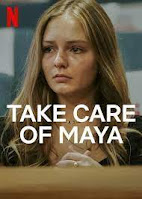I recently attended the 22nd edition of the Tribeca Festival in New York City, where I saw twenty feature films, a surprising number of which were quite good. I hope to write about several of those in this space. Short Takes #1 was my review of the latest Disney/Pixar feature film, Elemental. Read it HERE. Today, I’ll discuss a very different movie, a powerful new Netflix documentary, just released on the streaming service on June 19th, the day after the film festival concluded. It’s called Take Care of Maya.
Take Care of Maya is the amazing, heartbreaking story of how young Maya Kowalski and her family were victimized and torn apart by a medical-legal system ostensibly dedicated to protecting the child from harm. Extensively researched, beautifully constructed, and dedicated to what the director, Henry Roosevelt, calls “emotional truth telling”, the documentary is a wrenching call to action that focuses on one tragic case-in-point that illuminates a far larger, largely unchecked problem. The family’s story has been the subject of a long-running, ongoing lawsuit (set for trial in September) that has recently received significant media attention, including the lead article in the June 19, 2023 edition of People, entitled “They Said My Mom Tried to Hurt Me. They Were Wrong.”The story starts back in 2015 in Venice, Florida, when Maya, then ten-years-old - daughter of Beatta, a nurse, and Jack, a firefighter – got sick. Her skin became ultra-sensitive, she had unbearable, unrelenting pain and weakness in her legs to the point she was unable to walk, excruciating headaches, lesions all over her body, and more. Taken to numerous medical specialists, no one could figure out what was causing these symptoms. In the absence of a physical diagnosis, some suggested that Maya’s condition might be psychosomatic. Beatta determinedly pursued a more satisfactory answer, and her research led the family to the RSD/CRPS Treatment Center and Dr. Anthony Kirkpatrick, a specialist in a rare disorder known as Complex Regional Pain Syndrome (CRPS). This was in fact what Maya was suffering from. When Maya did not respond to milder treatments, Dr Kirkpatrick recommended a more radical approach involving high-dose ketamine infusions. This helped a lot and, followed up with physical therapy and lower doses of ketamine, Maya got a lot better.
So far, so good. But one year later, Maya, now 11, had a severe relapse one night and woke up screaming. in pain. She was rushed to Johns Hopkins All Children Hospital ER. Beatta, herself a nurse, tried to explain Maya’s past history and how she needed to be given ketamine immediately, that being the only treatment that had effectively helped her the previous year. But the pediatricians at Johns Hopkins were not familiar with CRPS, saw ketamine as a dangerous recreational drug, and perceived Beatta’s adamant advocacy for Maya as evidence that she was some kind of nut-job. Over the next few days, as Maya continued to suffer, a social worker and an “expert” child abuse physician affiliated with the hospital decided that Beatta, was the problem. They suspected that she had been mistreating Maya, falsely labeled Beatta as having Munchausen syndrome by proxy, and on this basis obtained a court order suspending Beatta and Jack’s parental rights and barring them from having any contact with Maya (and vice versa). When they lawyered up to fight this, the court continued to side with the “experts” and refused to lift the restrictions on Maya’s parents. This went on for months, with Maya remaining in hospital alone and suffering. This was tragic enough, but then it got much, much, unforgivably worse.Take Care of Maya shines a light on these events, and their effect on Maya and her family, through interviews (some archival, some current) with many of the people involved - lawyers, physicians, family members, others who’ve experienced similar injustices – as well as a trove of contemporaneous documents, recordings and notes created and saved by the meticulous Beatta. But even with all that, Maya herself, now 17, through her tears, is the most eloquent witness.
As it unfolded, I was shocked and angered by the story and, frankly, moved to tears. The film humanizes a situation which is, I fear, all too prevalent – in which a process intended to prevent child abuse may be the purveyor of such abuse. The case it presents is damning against the self-righteous folks who act as judge and jury in these situations, without listening, without reflection, and without seeing or understanding the damage they may be doing to the children they are supposed to be protecting. Of course, the system that gives such people so much power to pass judgment on parents and children is also implicated. The “self-righteous folks” I refer to are not so much the black robed judicial officers at the courthouse – although, in their blind deference to the opinions of so-called experts working for big, influential medical centers or state agencies over any evidence offered by family members and their advocates, those judges also bear much of the blame.Take Care of Maya is hard to watch because it is upsetting, but it is very much worth your time. Highly recommended.
1 hour 43 minutes
Grade: A
Currently streaming on Netflix



No comments:
Post a Comment